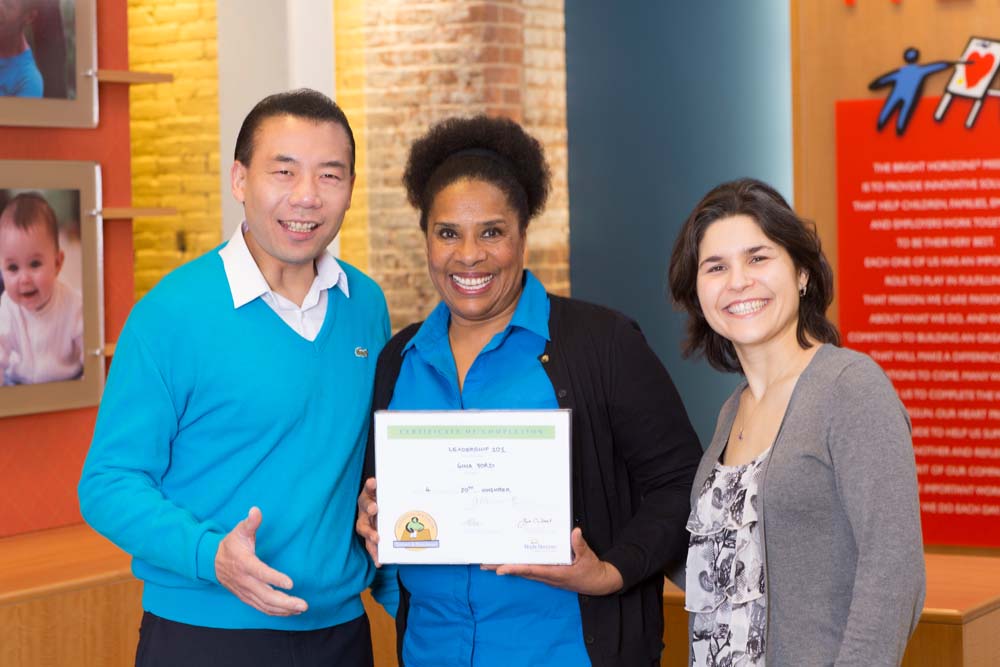The following post was written by Jodi Detjen, Managing Partner of Orange Grove Consulting, Clinical Professor of Management, Director of the MBA Program at Suffolk University, and co-author of The Orange Line: A Woman's Guide to Integrating Career, Family, and Life. Jodi is an accomplished organizational consultant and educator with a foundation in operational change management and was a recent guest on Bright Horizons' Work/Life Equation podcast.
Organizations want to support their employees so that they are more focused and effective in their work. But, they often ignore how helping employees manage the multitude of micro-decisions related to their responsibilities outside of the job can actually give them valuable skills that apply in it.
Let's take your employees who are parents. They are regularly thinking about decisions on who's making dinner, who's working from home when a child is sick, who's making the doctor's appointments. These micro-decisions usually are made by default. That is, typically, the mother is the default person for taking care of the micro-decisions of managing a family. Almost everyone assumes "she" will just do it - including her, her manager and peers. And increasingly, this is affecting dads too.
The impact is that simply by default, rather than by a conscious decision-making process, parents have an additional workload on them that increases their stress, their requirement for costly micro-movements in their thinking, and the guilt as they try to meet the needs of multiple stakeholders (e.g. client, manager, peers, family).
The decisions are micro. Everyone makes them initially and then rarely evaluates whether they are still the best person to do a given task.
But these micro decisions have enormous implications for the business. And organizations typically ignore the opportunity to help employees unlock this trapped potential. So what can be done to change?
This occurs not just with parenting. It happens when someone gets sick, a family member requires care, or even simple life-care responsibilities like getting a physical.
Organizations assume that everyone already has these skills and yet most don't. So people struggle to "balance" work and life when in fact, it's a skill that can be developed.
Instead, organizations can look at this as an opportunity to train 21st century skills.
Micro-decisions add up to a lot more work and stress unnecessarily. By giving employees the tools to think more overtly and strategically about these seemingly small items, the organization gets more effectively skilled employees and employees get a more integrated life.
Want to learn more about the 21st century skillsets? The full white-paper outlines all 12 skills in depth.
Organizations want to support their employees so that they are more focused and effective in their work. But, they often ignore how helping employees manage the multitude of micro-decisions related to their responsibilities outside of the job can actually give them valuable skills that apply in it.
Let's take your employees who are parents. They are regularly thinking about decisions on who's making dinner, who's working from home when a child is sick, who's making the doctor's appointments. These micro-decisions usually are made by default. That is, typically, the mother is the default person for taking care of the micro-decisions of managing a family. Almost everyone assumes "she" will just do it - including her, her manager and peers. And increasingly, this is affecting dads too.
The impact is that simply by default, rather than by a conscious decision-making process, parents have an additional workload on them that increases their stress, their requirement for costly micro-movements in their thinking, and the guilt as they try to meet the needs of multiple stakeholders (e.g. client, manager, peers, family).
Decisions at Home, Playing Out at Work
The same thing happens at work (whether they are parents or not). Managers decide that they can't delegate running the meetings so they end up running them forever. They fail to take the time to train their staff on how to analyze the data with Excel, so they are the ones who consistently stay up late to finish the analysis. Managers' PowerPoint skills have been honed for a decade, so they do all the decks.The decisions are micro. Everyone makes them initially and then rarely evaluates whether they are still the best person to do a given task.
But these micro decisions have enormous implications for the business. And organizations typically ignore the opportunity to help employees unlock this trapped potential. So what can be done to change?
It starts early
Most parents show up to parenting with very little experience - both men and women. Many organizations offer maternity leave but no other training. There might be a mother's group but organizations rarely help new parents - both men and women - figure out how to negotiate the boundaries at home and at work. It feels almost like it "should" be separate.This occurs not just with parenting. It happens when someone gets sick, a family member requires care, or even simple life-care responsibilities like getting a physical.
Organizations assume that everyone already has these skills and yet most don't. So people struggle to "balance" work and life when in fact, it's a skill that can be developed.
Instead, organizations can look at this as an opportunity to train 21st century skills.
What can you do?
There are two fundamental skillsets that help your employees manage their lives.- A desire to do more with less time balancing impact and effort. By balancing impact (what matters most) with effort (how much it takes to get a particular task done), employees can prioritize their tasks and help get the 'right' things done in a timely matter. No matter whether for tasks at home and at work.
- Fostering cooperation and interdependence to develop others and collectively share the workload. Teaching employees to work collaboratively, re-negotiate expectations and get support where required enables employees to take responsibility for achieving their goals and avoid just piling on the work.
Micro-decisions add up to a lot more work and stress unnecessarily. By giving employees the tools to think more overtly and strategically about these seemingly small items, the organization gets more effectively skilled employees and employees get a more integrated life.
Want to learn more about the 21st century skillsets? The full white-paper outlines all 12 skills in depth.





